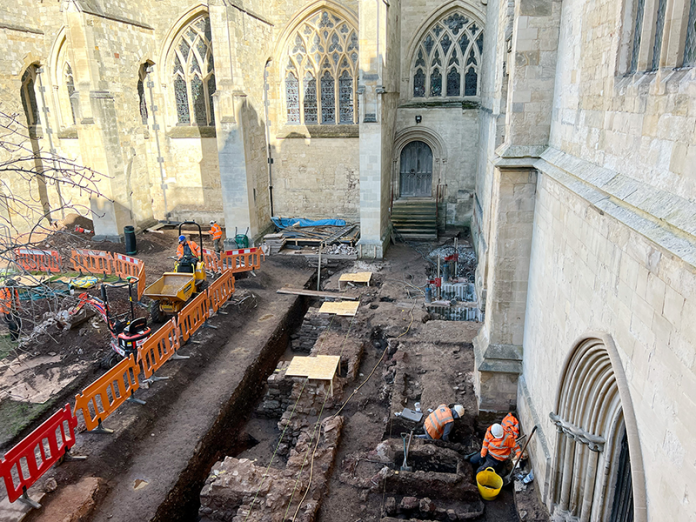New discoveries from the Roman period have been made by archaeologists investigating Exeter Cathedral’s historic Cloister Garden
The new clues to Exeter’s distant past include remains of an early Roman street and timber buildings, and a wall of a Roman town house that was later overlain by the foundations of the medieval cloisters.
Cathedral Archaeologist, John Allan, says the finds help to build a clearer picture of how the site would have looked in Roman times:
“The street and early timber buildings date from c. AD 50–75, and formed elements of the Roman legionary fortress which underlies central Exeter; they probably represent part of a long barrack building which extended towards the grant stone bath-house exposed under the Cathedral Green in the early 1970s. The later stone wall is part of a previously unknown town house of the 3rd and 4th centuries.”
The archaeological investigation is part of the cathedral’s project to build a new Cloister Gallery, replacing medieval cloisters which were demolished in 1656. The new Cloister Gallery will be built upon the medieval foundations of the original cloisters to connect the cathedral with its Chapter House and Pearson buildings.
Building conservation specialists have already begun repointing the 13th and 14th century walls and installing new draining systems ready for construction to begin. Other development works taking place in the Cloister Garden include the initial preparation of the Pearson Building. The 19th century building will be used to house a new Treasures Exhibition and shop, as well as improving accessibility with lifts and new toilet facilities.
Alongside the works in the Cloister Garden, Exeter Cathedral’s stonemasons have been carrying out crucial restorative work on the exterior of the medieval Chapter House. This has involved carefully cleaning and repointing existing stonework in addition to identifying blocks that need to be replaced before carving new stonework using materials that have been matched to the existing masonry.
Further phases of the project would see approximately half of the Grade I listed heritage site conserved and refurbished. Works include conservation of the cathedral’s 50 medieval misericords (or ‘mercy seats’), a more sustainable heating zoning system, and new visitor interpretation to explain the history of the cathedral.
The work is being funded by Exeter Cathedral’s 2020s Development Appeal which aims to raise £10 million. The appeal has already received a £4.3 million grant from The National Lottery Heritage Fund, and £1.9 million from other grant-giving trusts, foundations, corporate and private donors.
As Jill Taylor, Director of Development at Exeter Cathedral, explains, the funds will support essential improvements and a calendar of community activities and events designed make the ancient Devon landmark more inclusive, accessible and sustainable for the future:
“We have been overwhelmed by the level of support and affection for this unique Devon landmark. But of course, we still have a way to go to reach our goal of ensuring a truly sustainable future for Exeter Cathedral, for generations to come.”
As part of its fundraising efforts, the cathedral has recently launched its Adopt a Stone initiative, which offers people a chance to ‘adopt’ a piece of the new Cloister Gallery building, with options ranging from a single stone block, to an entire doorway.
Find out more about The 2020s Development Appeal >

